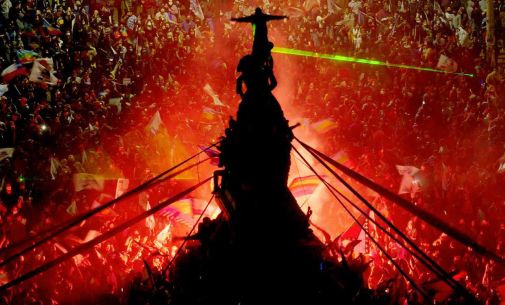By Glenn Dunks

The spectre of director Patricio Guzmán’s career lingers over his latest, My Imaginary Country. It would be hard not to considering he is the most prominent and prolific documenter of modern Chile. But in this case it feels different. It isn’t just a case of the viewer bringing their knowledge of the director’s work into a latest. Rather, the new work is reflecting those films going back fifty years.
For you see, Guzmán has made a name for himself detailing the horrors of the Pinochet dictatorship. Most prominently across two of the most impressive film trilogies you will ever see (The Battle of Chile parts one to three, and the run of Nostalgia for the Light, The Pearl Button and Cordillera of Dreams). He didn’t expect this beloved homeland to fall once again to civil war, which is what it appeared was happening in 2019...
Of course, thankfully, the Estallido Social as it was known there (or, the 'social outburst') ended with relative peace. At least for the time being. Something that Guzmán’s generation could have only dreamed about. The filmmaker is now 81 years old. It is fair to assume he may not be making movies for much longer. If My Imaginary Country were to be his last, it would be a fitting full stop on his career. Having spent so many years covering the worst of his country’s history, it is rather beautiful to see here a narrative that begins ominously familiar and yet ends in hope for the future and the Chilean people. A passing of the baton to a new generation of those to tell the story of Chile and its citizens. Even if he makes five more movies (entirely possible), there will be something really moving about seeing what Guzmán is able to do here so long after being exiled. Maybe looking forward rather than back.

The title of My Imaginary Country doesn’t become clear until much later in the film’s (relatively brief 80-minutes and change) runtime. It isn’t as fatalistic as it may seem from the start, capturing as he does Chile descending back into anarchy. Militarized police roam the street to keep young protesters at bay. Protesters who were inspired by unacceptable cost-of-living increases and who soon built up a movement to fight more generalised anti-right wing measures and to demand reform across a variety of sectors.
The footage taken of these protests is as visceral as they were in The Battle for Chile movies of the 1970s. Here, Guzmán and cinematographer Samuel Lahu have the added bonus of drone photography that is able to capture some, quite frankly, extraordinary shots of plazas full of bodies (1.2 million apparently) that stretch for miles. It’s the sort of stuff that puts so called freedom marches to shame. This is what real movement looks like. All of this is interspersed occasionally with beautiful black and white photography as well as talking heads with many of the women involved in the movement.
Women, in fact, are the only people shown on screen discussing the events with Guzmán, which is quite remarkable. When we see footage from inside the re-opened Chilean parliament, that there are so many women is a testament to how much of a role they played in sparking engagement with the cause—including through poetic song, produced as flashmobs across the country. Guzmán is smart in this way. And it never feels disingenuous, as if he has made this choice inorganically. When we hear the words, “The oppressive state is a macho rapist” it rings out. Guzmán knows a good story when he sees it and it gives My Imaginary Country a modernity and a radicalness that belies its director’s age.
There is a lot more going on here, as there always is. There is a fantastic anti-police thread that runs throughout, repeatedly asking the question of whether you can have such a thing as a “good cop” or not and what exactly would it look like if there was (probably quite tellingly, we are not offered any such example). There are issues around first nations people too, with a strong Mapuche woman rising through the ranks of political power towards the film’s end. In many ways, My Imaginary Country reminded me of Petra Costa’s fantastic The Edge of Democracy (an Oscar nominee, losing to American Factory). Not just because of the cross-over with South American democracy, but because of the tone and the way these two great filmmakers weave so much including the astutely personal throughout.
Guzmán is a smart enough filmmaker to know this is not the end of Chile’s story of democracy. One can only hope it improves from here. As what may be the end of Guzmán’s telling of it, however, he ends it on a hopeful note in the hands of the young and the strong.
Release: Opens in NYC this week through Icarus Films. Will open in L.A. and Boston next week before other cities follow.
Award chances: There’s likely not going to be many more opportunities for the documentary branch to recognise Guzmán and they have been open to films from this region recently (aforementioned The Edge of Democracy, but also something like Wim Wenders’ The Salt of the Earth and even The Mole Agent from Chile). I wouldn’t be predicting it, but I wouldn’t be surprised if they rallied behind him.